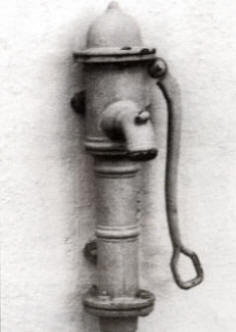
The census, courts, Christmas and cows
The Digger finds some interesting stories about his ancestors
 |
| One of the old farmyard pumps still in the district. This one may have been given some corn as a Christmas present in times gone-by! |
FINDING your roots is one of today's fastest growing hobbies, and with such a vast array of information being made available on the Internet these days, no-one is excluded from genealogy. Many people keenly anticipate the release of the 1911 census for Counties Antrim and Down. That is soon to be made available to the public on the website of The National Archives of Ireland.
There will undoubtedly be an unearthing of a vast wealth of genealogical information for those interested, and some missing pieces of the 'family tree' jigsaw can be pieced together. It shouldn't detract in any way from the first golden rule of genealogy. Prior to embarking on further research, talk to the oldest living relations, ask plenty of questions and make a written record of what they say. There are too many of us harbouring regrets of not having done so in the past. Of course, the information you seek may not be forthcoming from a relation. There may even be some skeletons remaining in the cupboard producing sealed lips. Don't give up at this stage though. Experience dictates that there are always older people who were friends and neighbours of the ancestors. Some of the stories and events of the past once swept under the carpet may well remerge again.
Matters in the past, once considered to be shameful and best left unspoken, strangely, now have some appeal to the modern researcher. Some family history researchers consider it a disappointment when there are no apparent links to sheep rustlers, highwaymen and vagabonds. A search through some of the old local newspapers in the district can prove interesting. The birth, marriage and death columns are an obvious source of information to the family historian, but so too are the press reports relating to the local petty sessions and higher courts. Neighbour disputes, petty crime, civil claims, libel, thefts are amongst the cases dealt with.
It was therefore no surprise to me when I discovered the names of three 'ancestors' who had appeared as defendants in three separate cases in the local courts in relation to minor misdemeanours.
Some of these reports give an insight into their daily lives.
I had discovered that two men who married two sisters in my maternal 'lineage' had died within days of each other in the 1940's. Not only had they links through marriage, death and burial place, they both had appeared independently of each other in front of a local magistrate in 1901 in relation to charges of adulterated buttermilk.
One was fined £1 and costs for the offence of adding excess water in the churning process. The other case was brought to the local petty sessions for selling adulterated buttermilk with 22.5 per cent of water in addition to the 20 per cent permitted for churning. A local inspector had taken samples on the request of Hughes Bakery, Springfield Road, Belfast. It was interesting to note that they owned just 12 cows and they churned on a Thursday using horse power. The household received a half penny a pound above market price for their butter. The case was appealed but the fine of 40s and 20s costs was upheld.
Later I discovered that a paternal great uncle in the 1930's had also fallen foul of the law. It was stated that he was the owner of 22 cows. Samples of his milk were taken from his cans that were sitting by the roadside one morning. One was found to contain 20.7 per cent added water, whilst the other two contained 12.7 and 15.5 per cent respectively. His defence was that no water could be added without his knowledge and that on the date in question there was no water available at milking time due to the frost. He claimed that he had been unable to get water for his porridge at breakfast time until the ice was broken around the pump. He did, however, manage to acquire a £3 fine with costs. In a similar case at Lisburn Petty Sessions in October 1929 the ruling did not always favour the prosecution. During the hearing of an alleged sale of milk found deficient in milk fat, the local magistrate was not convinced with the results of the local inspector of food and drugs and he commented "A lot of people think that dairyman always put in some water. I don't believe that."
In many parts of the district another story contrary to the magistrate's belief circulated many years ago. I have heard it repeated many times and in many different townlands throughout the area. Each time the story had been adapted to include the name of a local farmer and farm-hand to whom the story was attributed.
One of the recent versions related to me refers to a farmer and farmhand in the Ballinderry or Aghalee area. It had been a cold start to the winter and Christmas morning had arrived. In those times the farmhands were hired and usually stayed on the farm.
0n this occasion the farmer instructed the farmhand to give the cows an extra sheaf of corn that morning after milking, being the season of goodwill.
Later on that day the farmer happened to be outside crossing his yard when he noticed several sheaves of corn sitting at the water pump in his yard. Puzzled, the farmer summoned the farm hand and asked for an explanation.
"Well," came the reply. As far as I can see sir, it is the best milking cow that you have!!"
Visit the Diggers new web site www.glenavyhistory.com
26/12/2008
